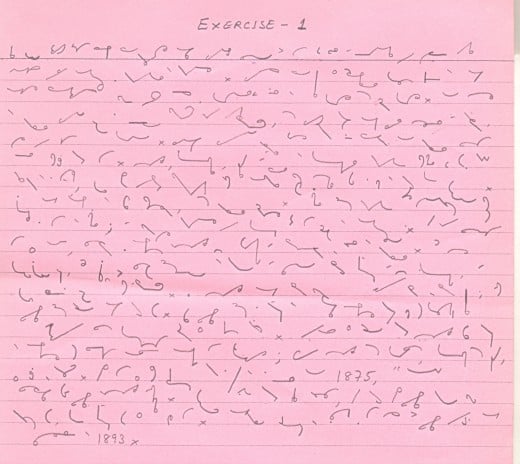Giving below a passage and its outline for the students of shorthand. Practicing these outlines will help you to improve your speed and accuracy.
If it is helpful to you, please comment in the comment box, so that more exercises can be added for practice.
Exercise 1
It is evident that we shall hardly succeed in our business relations unless we understand something of the law that guards and guarantees our legal rights, and in the last resort enforces the performance of bargains.
We must in our duties as ordinary citizens have some degree of knowledge in the laws in order that we may protect ourselves against the felonious acts of felons or would be felons.
In matters of business we need to have a keener appreciation of our rights and obligations, or we shall probably fall into serious mistakes and possibly, lose our whole fortune.
Certainly we are not to suppose that men act honorably in business merely because they are constrained by the law.
Merchants, factors, agents and owners of factories perform their contracts without thinking about the possibility of a law suit.
Even as they respect the property of their neighbors from other motives than a dread of punishment for thieving.
Confidence in the honesty of others there must be, or business would be impossible. Contracts were performed long before there was a law of contracts; and numberless bargains are effected that the law would not think of enforcing. Much of our mercantile law is in fact simply the custom of merchants made authoritative and applicable to all grades of business.
What men have found convenient to do, what has conduced to the smooth working of buying and selling, has been adopted and made effective, and few seek to avoid their obligations. The merchants enjoyed special privileges and were subject to special duties; and their usages were binding only upon them. These usages were a body of customs by which trade was facilitated and they were more firmly established as time passed.
Recognized as binding by the merchants this body of customs was gradually incorporated into the law that everyone, whether merchant or farmer, factor or agent is constrained to observe.
Such law is, as was declared by a judge of a case in 1875, “neither more nor less than the usages of merchants and traders. They have been ratified by the decision of courts of law, which upon such usage being proved before them, have adopted them as settled law”.
In the present tendency to consolidate the law, most of the usages are contained in the sales of Goods act of 1893.
Shorthand Outline of the above exercise

Pitman Shorthand Speed Exercise 2
The view taken of the very diverse changes and chances of life varies with different people, and with the same people at different times. Some there-are who would perform the same journey, work at the same desk, have lunch at the same table day after day, year in and year out. They are, apparently, merely mechanical agents, and nothing short of sickness, culminating in chronic disease, would alter their habits. They cultivate a disinclination to exercise their undoubted right to change.
They prefer routine to risk, and are appalled when they consider the uncertainties that dog their paths from one cause or another. They carry on, accordingly, in the same way, year after year, until their decease. Our modern trade facilities have, indeed, removed from tolerably civilized societies many of the risks of famine or scarcity or sudden death or ruin that men ran in ruder times. We have a security of person and property such as was not enjoyed in the best days of the Roman peace; and the cheapness and ease of transport enable the surplus of one area to supply the deficiency of another.
Modern conditions have created a different atmosphere, and we are, in a sense, very different creatures. We are freed from the drawback of which Mill speaks: “In poor and backward societies, as in the East, and in Europe during the Middle Ages, extraordinary differences in the price of the same commodity might exist in places not very distant from each other, because the want of roads and canals, the imperfection of marine navigation, and the insecurity of communications generally, prevented things from being transported from the places where they were cheap to those where they were dear.
The things most liable to fluctuations in value, those directly influenced by the seasons, were seldom carried to any great distances. Each locality depended, as a general rule, on its own produce and that of its immediate neighborhood. In most years, accordingly, there was, in some part or other of any large country, a real dearth.... In modern times there is only dearth where there formerly would ave been famine, and sufficiency everywhere when anciently there would have been scarcity in some places and superfluity in others.”
Shorthand outline of the above passage




No comments:
Post a Comment